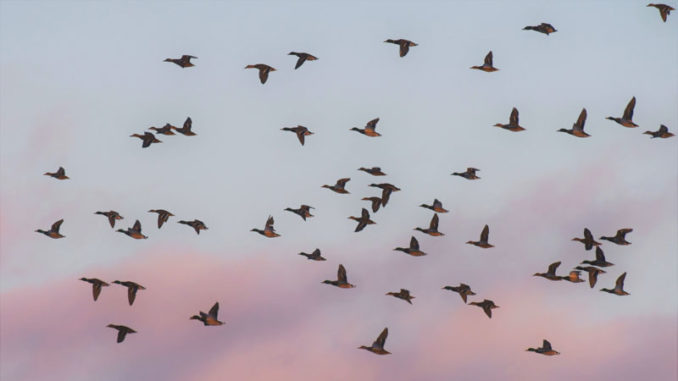
Officials will use long-term data to predict spring 2020 waterfowl abundance
For the first time in its 65-year history, the Waterfowl Breeding Population and Habitat Survey has been cancelled by the U.S. Fish and Wildlife Service (USFWS), Canadian Wildlife Service (CWS) and state partners due to COVID-19 restrictions.
The USFWS and CWS also cancelled participation in the American Woodcock Singing-ground Survey, Mid-continent Population Sandhill Crane Survey, and Arctic Goose Banding Program. The U.S. Geological Survey cancelled the North American Breeding Bird Survey, data from which is also important in monitoring bird abundance and regulating harvest of some species.
The May survey has been successfully completed every year since 1955 and its data used to estimate breeding population size and inform harvest management decisions for many waterfowl species.
Cancellation of these surveys will create a one-year gap in the record of waterfowl population estimates. The USFWS, in consultation with the Flyway Councils, will use long-term data from spring/summer monitoring for these species to make regulatory harvest management decisions.
“Decisions to cancel the May survey and other migratory bird monitoring this spring were based on our priority of protecting the health and safety of the American public, our partners and our employees,” said Ken Richkus, Chief of the USFWS Division of Migratory Bird Management.
The 2021-2022 seasons
Duck season regulations are based on the status of mallards in the Mississippi, Central and Pacific Flyways and on the status of four species (green-winged teal, common goldeneye, wood duck and ring-necked duck) in the Atlantic Flyway.
Because of recent changes in how harvest regulations are set, survey cancellations will not affect the 2020-21 hunting season. Proposed regulations for the 2020-21 season were based on population and habitat conditions from the 2019 breeding season and are making their way through the approval process.
For the 2021-2022 general duck seasons, Richkus said the USFWS will use the long-term data and models to predict 2020 spring abundances of ducks and habitat conditions in place of the spring 2020 data. The results from these predictions will be combined with the existing harvest strategies to determine appropriate levels of harvest for the 2021-2022 season.
Current travel restrictions in Canada, unless modified, may also affect many goose banding program efforts and surveys as well as high latitude duck banding stations this summer.
“These surveys are the bedrock of effective harvest management in North America and have helped sustain waterfowl populations and abundant hunting opportunities for over 60 years,” said Ducks Unlimited Chief Conservation Officer Karen Waldrop. “Although we will miss the anticipation and excitement that comes with the annual release of the May survey results, we don’t expect the cancellation of surveys to impact seasons and bag limits for the majority of species. The combination of healthy, robust waterfowl populations and our long-term experience with these data, gives us faith that the waterfowl management community can project populations with a high level of certainty.”